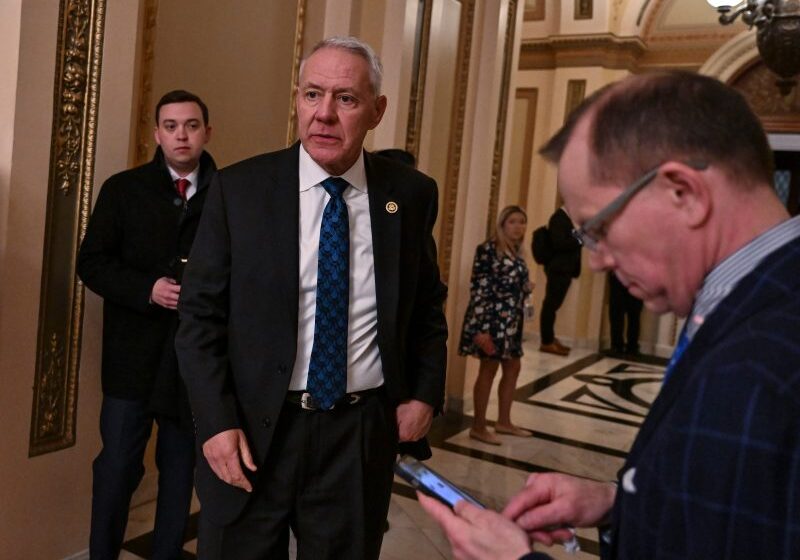Russian missiles rained down on Ukraine just ahead of Treasury Secretary Scott Bessent’s visit
The Great Resignation hits Congress: Lawmakers are quitting, too


Despite all the congressional gridlock these days, lawmakers have succeeded in one surprising area of productivity: driving their colleagues into resignation.
On Friday, Rep. Ken Buck (R-Colo.) will resign outright, becoming the sixth member of the House in the 118th Congress to quit, with no other public office lined up. The onetime renegade conservative, who’s drifted ideologically away from his far-right friends, summed up the feelings of the quitters.
“This place just keeps going downhill, and I don’t need to spend my time here,” Buck told reporters.
The data for congressional resignations is somewhat murky, but it’s clear that over the last four decades, at least, the House hasn’t seen this many people just quit public service in the middle of their term.
It started last May when Rep. David N. Cicilline (D-R.I.) resigned after more than 12 years in office to lead the Rhode Island Foundation, and soon after Rep. Chris Stewart (R-Utah) resigned to start a lobbying firm. Earlier this year Rep. Brian Higgins (D-N.Y.) quit to go home for a Buffalo arts job, while Rep. Bill Johnson (R-Ohio) left to take over as president of Youngstown State University.
These next jobs are all interesting, most paying much better than a rank-and-file lawmaker’s $174,000 salary, with more flexible hours.
But the usual pattern for burned-out lawmakers would be to wait out these congressional jobs until they finished the two-year term that they promised to their constituents when they voted for them.
That’s the plan for most of the 45 members of the House who have announced they will retire at the end of this year, a large number compared with other Congresses. But these 45 will at least serve out their terms.
Buck warned that more resignations could be coming. Those who are staying behind understand what’s driving this rush to the early exits, blaming internal GOP chaos for making the House a legislative ghost town most weeks.
Tensions reached such a boiling point among House Republicans that only about 40 percent of the 218 members of their conference attended their issues retreat in West Virginia, leading to the cancellation of their Friday panel discussions so lawmakers could leave Thursday night instead.
“The House didn’t reach its potential in a lot of areas. We had infighting. We had a speaker debate. We had a debt debate. There’s a lot of frustration,” said Rep. Ryan Zinke (R-Mont.), who is on his second tour of Congress after leaving in early 2017 when he was appointed interior secretary.
That period, in the 115th Congress, served as the high-water mark for members resigning from the House, with 16 total in 2017 and 2018, according to a review of four decades of data provided by the House library. (This analysis does not include members who resigned a couple of days before their term ended in early January, oftentimes a clerical move for tax and bookkeeping purposes.)
Of the 16 who quit in 2017 and 2018, Zinke and four others left to get more prominent jobs in the Trump administration, one left to become his state’s attorney general, and one left to run for Florida governor. Five others got caught up in sexual misconduct scandals and resigned in disgrace.
Just four House members quit midterm in the 117th Congress to leave for private-sector jobs.
New administrations often poach talent from Capitol Hill, so the 111th Congress in 2009 and 2010 saw 10 House members quit early. Seven of those either received appointments to the Obama administration or ran for higher office back home, such as Reps. Neil Abercrombie (D-Hawaii) and Nathan Deal (R-Ga.), who resigned early to concentrate on their successful bids for governor in their states.
In the 117th Congress in 2021 and 2022, which some consider one of the most productive in the last two decades, 12 House members resigned, with six heading for either posts in the new Biden administration or to seek higher-profile offices back home.
Two left amid scandal and four resigned to move into the private sector, but at this stage of the previous Congress, just two members had quit the House to move into the private sector. Buck’s resignation will triple that pace for the current Congress.
For what it’s worth, senators have much greater job satisfaction than their House counterparts. Over the last decade, just nine senators who were duly elected have resigned while they were still in term.
Four left for health reasons, such as Sen. Tom Coburn (R-Okla.), who eventually died in 2020 after a long bout with prostate cancer, while three went into higher office, such as then-Sen. Kamala D. Harris (D-Calif.) becoming vice president and Sen. Jeff Sessions (R-Ala.) becoming attorney general.
Sen. Ben Sasse (R-Neb.), who served just eight years in the Capitol, is the only senator in the last 10 years to give up on public office and resign midterm, to become president of the University of Florida early last year.
In the House, this 118th Congress started off on one of the most dysfunctional notes since the 19th century — 14 failed ballots to elect a speaker, before finally Kevin McCarthy (R-Calif.) rounded up enough votes for the gavel — and things have trended sideways pretty much ever since.
By late February 2023, Cicilline — just 61 at the time, relatively youthful in Congress — had seen enough and announced he would leave for the influential nonprofit in his state, almost quadrupling his salary.
His last day, May 31, was the same day as a critical vote to avoid default on the nation’s debt, when the Democrats had to bail out then-Speaker McCarthy and hand him about two dozen votes on a normally perfunctory parliamentary vote to advance the legislation to a final roll call.
He weighed the choice between running a foundation giving out nearly $90 million annually in grants or “spending the next few years in the House,” as Cicilline explained his thinking to a Providence CBS affiliate.
It was an easy answer, he said. “There was no question that I am certain that I am going to have more impact on Rhode Island.”
Asked Friday if he has any regrets over his decision to leave, he wrote back a concise response: “No regrets.”
Three days after his resignation in September, Stewart announced the launch of a lobbying firm with his longtime chief of staff.
Two weeks later, McCarthy got thrown out of the speakership by eight of his own colleagues, initially saying he would serve out the remainder of his two-year contract with his constituents. He resigned just after Christmas and has not announced his next chapter.
A few weeks after McCarthy got forced out of the speaker’s office, Higgins and Johnson announced they would also resign, effective in January and February. No waiting to serve the rest of their term.
“My sense is, I can just do more constructive things with my life,” Higgins told The Washington Post at the time.
Buck had initially announced he would serve out his term but not seek reelection, yet he couldn’t take how petty the place had become, so on Tuesday he gave 10 days’ notice of his resignation. He noted, as the most outspoken GOP opponent of possibly impeaching President Biden, he was the last lawmaker allowed to question a witness Tuesday despite being third in seniority.
“We’ve taken impeachment and we’ve made it as a social media issue as opposed to a constitutional concept,” the GOP impeachment skeptic complained.
Those who are sticking around, at least through December, don’t hold grudges against those bolting early. But they tell their colleagues the stakes have never been higher.
“This place is insane. But I love it, sincerely. Because you need people to say, like: This is insane, we have to stop doing this,” said Rep. Abigail Spanberger (D-Va.).
“There’s some frustration in the House. But I remind my colleagues that we’re the only thing between America that we know and love and Biden’s agenda. We’re the only stop,” Zinke said.
Spanberger will retire at the end of this year and then devote herself full time to running for governor next year. She said she doesn’t want to try to do both jobs, being a congresswoman and a candidate, at the same time.
Zinke has the unique perspective of having seen the House as its dysfunction started, early last decade, and then to return early last year. He sees a dramatically changed place that takes a heartier soul than it once did to stick around for a long time.
“You know, if you don’t have the fire in the gut, maybe it is time to leave,” Zinke said.
Rep. Mark Green (R-Tenn.) tried to escape, announcing that after just three terms he would retire at the end of this year despite holding a powerful committee chairmanship. But then senior Tennessee Republicans called and pleaded with him for one more term, even getting Trump to call and ask him to run.
He said yes but wasn’t exactly excited. “More of a sense of duty than really anything,” Green said in a brief interview Wednesday.
But he might be one of the first House members to quit midterm next year, as he considers a run for governor in 2026.
“I certainly won’t campaign for another office while I’m sitting in this office, I can tell you that,” Green said. “I would step down.”











